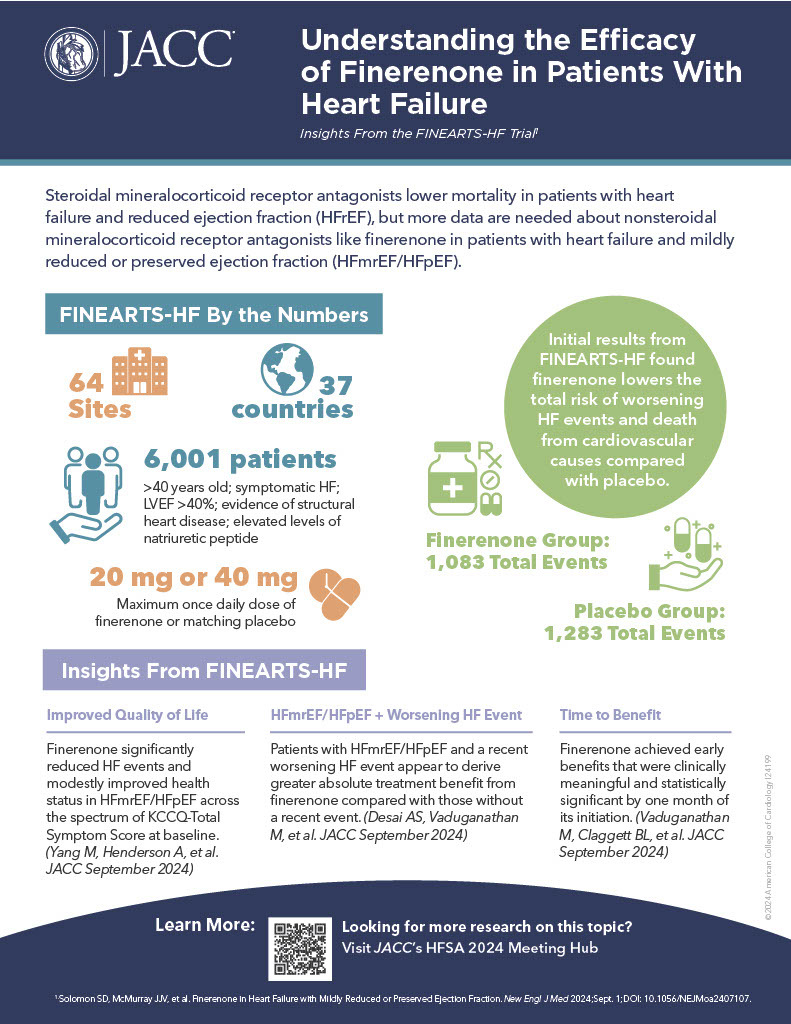New FINEARTS-HF Analyses Further Explore Impacts of Finerenone in Patients With HFmrEF and HFpEF
Steroidal mineralocorticoid receptor antagonists lower mortality in patients with heart failure and reduced ejection fraction (HFrEF), but more data are needed about nonsteroidal mineralocorticoid receptor antagonists like finerone in patients with heart failure and mildly reduced or preserved ejection fraction (HFmrEF/HFpEF).
During ESC Congress, initial results from FINEARTS-HF found finerenone lowered the total risk of worsening HF events and death from cardiovascular causes among roughly 6,000 patients with HFmrEF and HFpEF from 64 sites in 37 countries compared with placebo. Three new studies presented at HFSA and simultaneously published in JACC, dive further into the FINEARTS-HF data to explore the impact of finerenone on quality of life, time to benefit, and in patients with HFmrEF and HFpEF who have also experienced a worsening heart failure event.

In a prespecified analysis exploring quality of life, Mingming Yang, MD, PhD, Alasdair D. Henderson, PhD, et al. assessed the efficacy and safety of finerenone according to baseline KCCQ Total Symptom Score (KCCQ-TSS) and the effect of finerenone on KCCQ-TSS. Results showed finerenone significantly reduced HF events and modestly improved health status in HFmrEF/HFpEF across the spectrum of KCCQ-Total Symptom Score at baseline.
Another analysis by Muthiah Vaduganathan, MD MPH, Brian L. Claggett, PhD, et al. found finerenone achieved early benefits in patients with HFmrEF and HFpEF that were clinically meaningful and statistically significant by one month of its initiation. “While HF with mildly reduced or preserved ejection fraction has conventionally been managed with a lesser sense of urgency compared with HF with reduced ejection fraction, these data underscore the early modifiable risks faced by this population and support the rapid implementation of finerenone alongside other standard of care therapies such as the sodiumglucose co-transporter-2 inhibitors,” the authors note.
Patients with HFmrEF and HFpEF who had also experienced a recent worsening HF event, appeared to derive greater absolute treatment benefit from finerenone compared with those without a recent event, based on findings from a post-hoc anaylsis by Akshay S. Desai, MD MPH, Muthiah Vaduganathan, MD MPH, et al. According to the authors, these findings require further confirmation in future studies.
In a related Editorial Comment in JACC, Felix Lindberg MD PhD, and Gianluigi Savarese MD PhD, say a “reassuring message from this post-hoc analysis is that treatment initiation in close proximity to a worsening HF event is both safe and beneficial, with the potential to yield greater absolute risk reductions and lower numbers needed to treat … This finding is important for treatment implementation, which, as we know for other treatments, is more likely occurring in secondary care/in-hospital.”
Access additional FINEARTS-HF resources, including a video interview, infographic and two Journal Clubs on the JACC HFSA 2024 Event Page.
